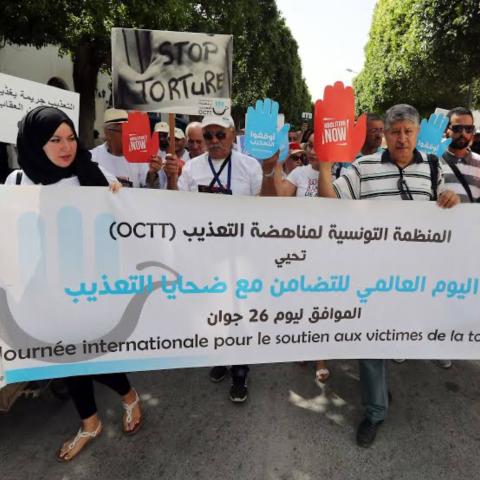
On 26 June, several Tunisian human rights organisations launched a series of events to defend the right to life and human dignity as well as to fight torture in the country on the occasion of the International Day in Support of Victims of Torture under the slogan "No to torture!"
In a statement, the organizations said their campaign comes in a "worrying political context marked by the resurgence of institutional violence and impunity, threats to the gains of the Tunisian people and their right to enjoy collective and individual freedoms continue to grow."
This comes at a time when the World Organisation Against Torture has documented 187 new cases of torture in Tunisia since the beginning of 2022, underscoring President Kaïs Saïed's dangerous takeover of the country's judicial system through the government's broad powers.
In this context, the organisations recall Tunisia's obligations under the UN Convention against Torture, which it ratified in 1988, which states that "No exceptional circumstances whatsoever, whether it be a state of war or threat of war, internal political instability or any other state of emergency, may not be invoked as a justification of torture".
Tunisia is the scene of a systematic targeting campaign by President Kaïs Saïed against political opponents, journalists, judges, activists, human rights defenders and migrants.
Action of Alkarama
In its contribution to Tunisia's last Universal Periodic Review (UPR) before the Human Rights Council in November 2022, Alkarama, based on documented cases and numerous testimonies it has received from victims of ill-treatment and torture, expressed its fears about the resurgence of this practice in police stations and places of detention.
An Alkarama team also followed the deliberations of the constructive dialogue session and noted a number of recommendations and comments made by States to the country under review.
During the UPR, the Tunisian delegation did not address the issue of the use of military courts against civilians for acts of freedom of expression. He said only that military courts were "independent" and that those tried had the right to a lawyer.
In February 2022, the UN High Commissioner for Human Rights, Volker Türk, expressed concern about the escalating crackdown in Tunisia against civil society and political opponents of President Kaïs Saïed.
In its 2022 annual report, Alkarama highlighted the deteriorating human rights situation in Tunisia, noting the main concerns expressed in its UPR report to the Human Rights Council, especially since the suspension and subsequent dissolution of parliament by President Kaïs Saïed.
The political crisis in the country has worsened since 25 July 2021, when Saïed sacked the prime minister, suspended the work of parliament for 30 days, and assumed all executive and legislative functions.
